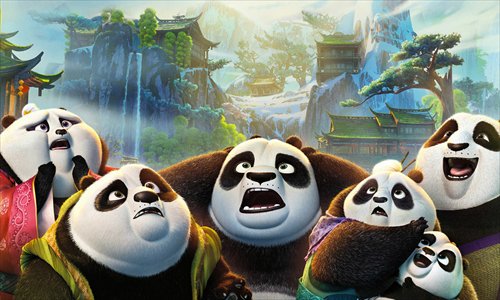China not interested in Chinese-speaking panda

Promotional material for Kung Fu Panda 3. Photo: CFP
Pandas, kung fu, steam buns and Chinese architectures and clothing, there is probably no animated film featuring Chinese culture that is more popular than the Kung Fu Panda films. Trying to get a bigger piece of the Chinese mainland market, a Chinese dubbed version of Kung Fu Panda 3, the newest film in the series, has been specially made for the mainland. However, it seems that local moviegoers do not seem to be appreciating this "favor" as many netizens in China have been arguing that they'd rather go watch the English version.
Original is better
The second largest film market in the world and very likely to reach No.1 soon, China is seen as a land of gold opportunity for many film studios. Compared to other films looking to cater to the Chinese market, instead of forcing in some Chinese actors and brands, Kung Fu Panda 3 has gone that extra mile for the market.
Co-produced by DreamWorks Animation and China-based Oriental DreamWorks, all the characters in the Chinese version have been reworked to better ensure that characters' mouths match their dialogue.
Despite these efforts, it seems that Chinese audiences, who have grown accustomed to watching Hollywood films with Chinese subtitles, are finding it difficult to accept a Chinese language version.
"After I watched both trailers for the film, why do I feel like the Chinese version is for kids and the English version for adults? It's strange," netizen My Name is 411 posted on Chinese film website mtime.com.
"Though this film seems to be filled with Chinese elements, it just makes me feel weird," gorblin, another netizen, posted.
"When I think of an imported works dubbed in Putonghua (Standard Chinese), I'm reminded of old shows shown on TV when I was young. The way the characters would speak in Chinese but in a Western style was just odd," Xiao Mei, a 28-year-old office worker in Hangzhou, Zhejiang Province, told the Global Times.
"I know it's a weird mindset, but the idea that works are better in their original language is deeply ingrained in my heart. Anything reworked just for the Chinese market just comes across as trying too hard."
'Reading' a movie
"If I go see it, I'd rather watch the English language version," Fang Yu, leader of a Chinese dubbing community, told the Global Times after finishing watching the English and Chinese trailers for Kung Fu Panda 3.
"The Chinese star filled Chinese trailer seems to make the film incomplete, pulling me out of it."
Fang explained that sometimes when a famous Chinese star voices a character, audiences don't laugh because what the character is saying is funny, but because it's a voice they recognize. He also pointed out that most netizens who are posting on websites like mtime.com are film fans that tend to be pickier when it comes to film. However, "those that go to family films like Kung Fu Panda" do not care about such details. As such, he points out that the negative voices seen on these websites do not necessarily mean audiences as a whole won't see the Chinese version.
Looking at Kung Fu Panda 3's Chinese trailer, Tengxin, a professional voice actor who has worked on the Chinese dubs of films like Interstellar and Monster University, said that in his opinion the celebrity cast for the Chinese version of Kung Fu Panda 3 only gave mid-level voice performances.
However, Tengxin does not agree with the idea that Chinese dubbed films are unnecessary or only for kids.
"Films like Interstellar and Inception are difficult to understand only relying on subtitles. Characters speak fast and audiences have a hard time keeping up," Tengxin noted.
"The IMAX edition of the recent Star Wars film is another example. The screen was so big that I had to turn my head all the way to the side to read the subtitles and so was distracted from the main scenes."
While Tengxin believes the current prejudice Chinese audiences have towards dubbed films is due to the low quality of many dubs, Zhan Tao, a market manager for two Poly cinemas in Beijing, pointed out another two reasons - habits formed from watching imported TV series and vanity.
"The majority of moviegoers today were born between 1975-95 and grew up watching non-dubbed imported shows online and so are already used to that," Zhan told the Global Times.
"Also, when everyone is going to watch the English version of a film, people will feel embarassed to watch the Chinese dubbed version."
Zhan did add that there is still a market for well dubbed films, especially animated ones. Having already watched the full Chinese version of Kung Fu Panda 3, Zhan said that he is confident about the quality of the film's dub. With children already out on winter vacation, he plans to split screens at his theaters equally between the Chinese and English versions.
Newspaper headline: Hard on the ears